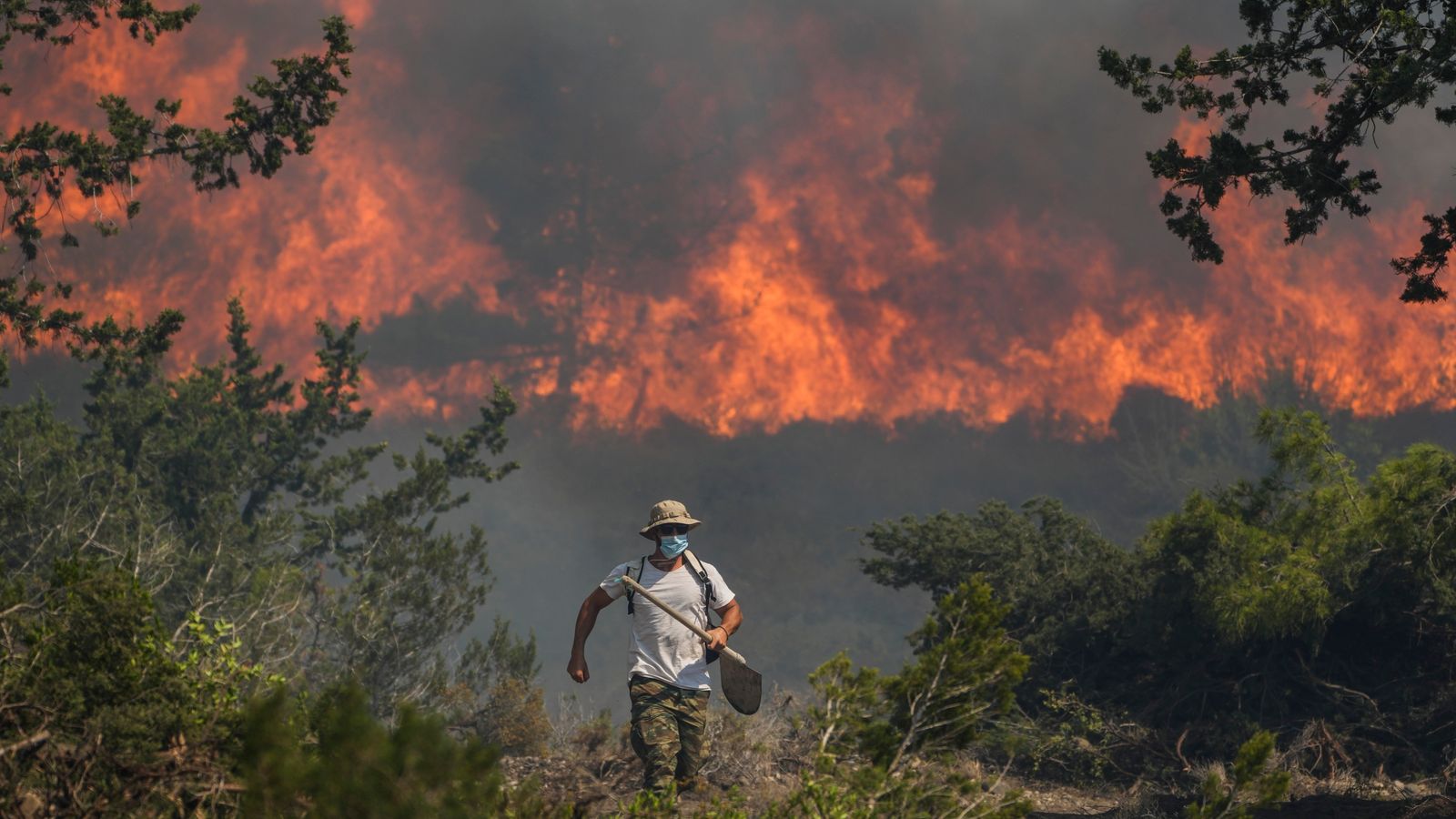Thousands of Britons have been flown back from Rhodes – with new estimates suggesting 10% of land on the Greek island has been burned by wildfires.
Additional flights bringing stranded holidaymakers landed in the UK overnight, and more are expected to arrive throughout the day.
As many as 10,000 Britons were estimated to be on the island, a favourite tourist destination, the Foreign Office said.
Holidaymakers who have returned have told of “traumatic” evacuations as their hotels were surrounded by flames.
Scores of people were forced to spend the weekend sleeping rough on beaches, sun loungers, or on the streets as wildfires raged.
Temperatures have risen above 40C (104F) in parts of Greece, and on Rhodes – a blaze is continuing to move inland, touching mountainous forest areas including part of a nature reserve.
Be the first to get Breaking News
Install the Sky News app for free
Desperate residents with wet towels around their necks have been using shovels to beat back the flames approaching their homes – with firefighting planes and helicopters resuming water drops at first light.
Sea evacuations have also been taking place at a beach in Corfu to transport individuals fleeing wildfires there.
Please use Chrome browser for a more accessible video player
‘We are at war’
Greek Prime Minister Kyriakos Mitsotakis has said “we are at war” and completely focused on tackling the wildfires.
He is holding crisis talks with his ministers on Tuesday and has warned difficult days lie ahead, with conditions possibly set to improve on Thursday.
Mr Mitsotakis warned: “I will state the obvious – in the fact of what the entire planet is facing, especially the Mediterranean which is a climate hotspot, there is no magical defence mechanism. If there was, we would have implemented it.”
Today, scientists have published an assessment that states human-induced climate change has played an “absolutely overwhelming” role in the extreme heatwaves seen worldwide in recent weeks.
Prosecutors on Rhodes are now investigating what has caused the fires, and examining the preparedness and response of the authorities.
Please use Chrome browser for a more accessible video player
It comes as Housing Secretary Michael Gove told Sky News on Tuesday that he plans to holiday on the Greek island of Evia in just over a week, and insisted the region is safe for holidaymakers despite fire concerns.
Some 77 firefighters were battling scattered outbreaks in Evia on Monday.
EasyJet repatriated 421 people back to the UK on two flights from Rhodes on Monday, with a third on Tuesday. This is in addition to nine scheduled flights to the island that are also taking place.
Jet2 had four repatriation flights scheduled for Monday evening – to Manchester, Bradford and Birmingham – with a total of 787 seats.
Fifty scheduled flights are going to take holidaymakers back from Rhodes this week, but each aircraft will leave the UK empty after all outbound flights and holidays were cancelled until Sunday.
Read more:
Scientists predict how often heatwaves will now occur
Holiday booked to Greece? Your rights amid Rhodes and Corfu fires
Please use Chrome browser for a more accessible video player
Fires force airport to close in Italy
In Italy, a wildfire forced the closure of Palermo airport in Sicily for a few hours, as firefighters worked to put out a major blaze in a nearby area that also disrupted local road and rail traffic.
The incident added to Sicily’s travel misery at the peak of the tourist season. On some parts of the island, temperatures rose to 47.6C (117.7F) on Monday – close to a record European high of 48.8C (120F) recorded there two years ago.
Italy has put 16 cities on red alert because of the high temperatures.
Meanwhile, an overnight storm tore off roofs and uprooted trees in Milan, blocking roads and disrupting transport.
Two women were killed on Monday and Tuesday in the northern Monza and Brescia provinces after being crushed by falling trees.
Deadly blazes in Algeria
In Algeria, wildfires have killed 25 people – including 10 soldiers trying to get the flames under control in the face of high winds and searing summer temperatures.
At least 1,500 people have been evacuated there.







